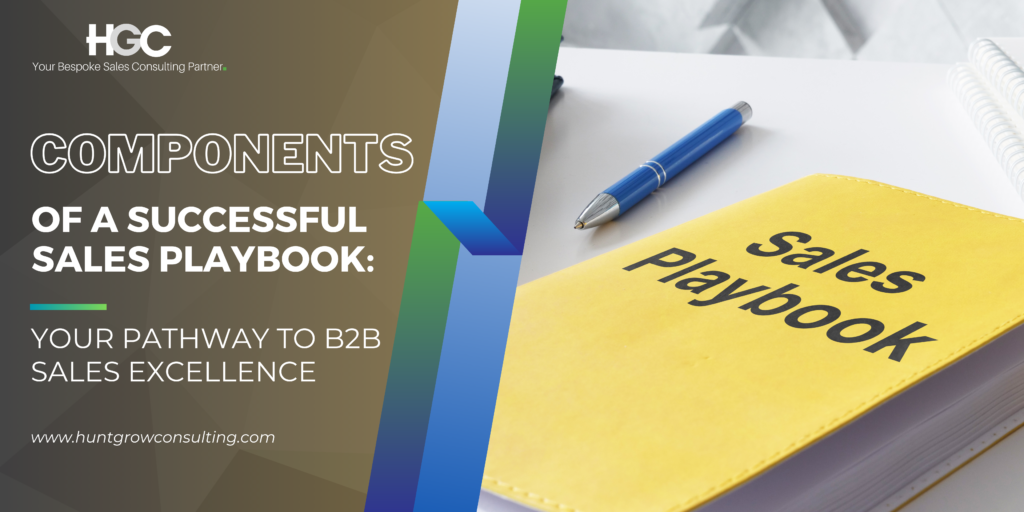A well-crafted B2B sales playbook can make all the difference in achieving success. A B2B sales playbook is a comprehensive guide that equips sales teams with the strategies, techniques, and best practices they need to excel in their roles. Whether you’re a seasoned sales professional or just starting your journey, understanding the critical components of a successful B2B sales playbook is crucial.
This blog post will explore 18 essential components contributing to a practical sales playbook, empowering your team to drive revenue, close deals, and exceed targets.
01. Target Market
Before embarking on any sales endeavor, clearly defining, and understanding your target market is essential. A successful B2B sales playbook begins with a detailed description of the ideal customer profile and target market segments.
This ensures that your sales efforts are focused on the right audience and allows for a more personalized approach.
02. Buyer Personas
To effectively engage with potential customers, sales reps must understand their buyers deeply. Developing detailed buyer personas helps sales teams identify the characteristics, pain points, motivations, and buying preferences of different types of customers.
This insight enables sales reps to tailor their messaging, address customer needs more effectively, and build stronger connections, ultimately increasing their chances of success.
03. Sales Process Overview
A well-defined sales process is a roadmap for sales reps, guiding them through each step, from prospecting to closing deals. Including a clear overview of the sales process in your playbook ensures consistency and provides a structured approach.
It helps sales reps understand their role at each stage, set realistic expectations, and identify potential bottlenecks or areas for improvement.
04. Sales Methodology
Having a defined sales methodology ensures a standardized approach to selling. It outlines the specific strategies, techniques, and principles that guide the sales process.
Whether consultative selling, solution selling, or another method, a sales methodology helps reps understand how to engage with prospects, uncover needs, present solutions, and ultimately close deals to align with the organization’s values and goals.
05. Value Proposition
A compelling value proposition is one of the fundamental components of a successful B2B sales playbook. Value proposition clearly articulates the unique value that your product or service offers to customers. It highlights the key benefits and competitive advantages, differentiating your offering.
A well-crafted value proposition enables sales reps to communicate the value effectively, capture the attention of potential buyers, and drive conversions.
06. Competitive Analysis
Understanding your competition is vital for success in sales. Including a thorough competitive analysis in your playbook helps sales reps identify competitors’ strengths and weaknesses. This knowledge allows you to position your offering more effectively, address objections, and tailor your approach based on the competitive landscape.
You can stand out in a crowded market by highlighting your unique selling points and win over prospects.
07. Objection Handling
Objections are a natural part of the sales process. A successful B2B sales playbook equips reps with the skills to handle objections effectively.
It guides common objections that arise and suggests strategies for overcoming them. By addressing objections proactively and confidently, sales reps can build trust with prospects and demonstrate their expertise, increasing the likelihood of a successful sale.
08. Sales Scripts and Templates
Consistency in messaging is vital to delivering a coherent and persuasive sales pitch. Sales scripts and templates provide sales reps with a framework for various sales process stages, including prospecting calls, discovery meetings, presentations, and closing deals.
While they shouldn’t be used verbatim, these resources serve as a starting point and help sales reps structure their conversations and ensure they cover vital issues effectively.
09. Sales Tools and Technology
Sales teams have access to a wide range of tools and technologies to enhance their productivity and effectiveness. A successful B2B sales playbook should identify and advise the tools, software, and technology platforms that support the sales process.
This may include customer relationship management (CRM) systems, sales enablement platforms, prospecting tools, communication platforms, and analytics tools.
10. Sales Metrics and KPIs
To gauge the success of your sales efforts, it’s crucial to define and track relevant metrics and key performance indicators (KPIs). A B2B sales playbook should identify the specific metrics and KPIs that sales reps should focus on, such as conversion rates, average deal size, sales cycle length, or customer acquisition cost.
Regularly monitoring these metrics allows for performance evaluation, goal setting, and targeted improvements.
11. Sales Training and Onboarding
Proper training and onboarding of sales team members are essential for their success. A successful B2B sales playbook should outline the training program and onboarding process. This may include product knowledge training, sales skills development, role-playing exercises, mentorship programs, and ongoing coaching.
Investing in comprehensive training ensures sales reps have the necessary knowledge and skills to excel in their roles.
12. Lead Generation Strategies
Generating a steady stream of high-quality leads is critical for sales success. A B2B sales playbook should include strategies and tactics for lead generation, such as inbound marketing, outbound prospecting, social selling, content marketing, or referral programs.
By providing a range of effective lead generation techniques, the playbook empowers sales reps to fill their pipelines and identify opportunities for conversion proactively.
13. Sales Territory Management
For organizations with territories or assigned accounts, effective management is crucial. The playbook should define the criteria for assigning accounts and provide best practices for optimizing territory coverage.
It helps sales reps understand their responsibilities, prioritize their efforts, and maximize their productivity within their assigned territories, ensuring a fair and efficient distribution of workload and resources.
14. Sales Collateral and Content
Supporting sales reps with relevant collateral and content is vital for effective selling. A successful B2B sales playbook should provide access to various resources such as brochures, case studies, presentations, and product documentation.
These materials help sales reps articulate the value proposition, educate prospects, and address specific customer needs or pain points, enhancing their credibility and persuasive abilities.
15. Sales Pipeline Management
Managing the sales pipeline effectively is essential for consistent sales success. A B2B sales playbook should define the stages of the sales pipeline, establish criteria for advancing deals, and provide best practices for managing opportunities.
This enables sales reps to track and prioritize their pipeline, identify potential bottlenecks, and take appropriate actions to move deals forward, ensuring a smooth and predictable sales process.
16. Sales Forecasting
Accurate sales forecasting enables organizations to plan and allocate resources effectively. A successful B2B sales playbook should describe the process for forecasting sales, including assessing deal probabilities, closing dates, and expected revenue.
Implementing a standardized approach to forecasting, organizations can make informed business decisions, set realistic targets, and take proactive measures to achieve their sales objectives.
17. Customer Success and Post-Sales Support
Customer satisfaction and retention are crucial for long-term success. A B2B sales playbook should outline strategies for nurturing customer relationships, ensuring customer success, and providing post-sales support.
Focusing on building strong relationships and delivering exceptional customer experiences, sales reps can drive upsells, referrals, and repeat business, contributing to revenue growth and customer loyalty.
18. Continuous Improvement
To stay ahead in the competitive sales landscape, continuous improvement is essential. A successful B2B sales playbook encourages sales reps to provide feedback and suggestions for improving the playbook.
It establishes a process for ongoing updates and revisions, incorporating new strategies, techniques, and market insights. By fostering a culture of learning and adaptability, organizations can continuously enhance their sales effectiveness and drive sustainable results.
Conclusion
A successful B2B sales playbook is an asset that empowers sales teams to achieve their goals and drive revenue growth. By incorporating the 18 critical components outlined in this blog post, organizations can create a comprehensive and practical B2B sales playbook that equips sales reps with the strategies, tools, and resources they need to excel in their roles.
Remember, a well-crafted B2B sales playbook is not a static document but an evolving guide that adapts to market changes and continuously improves to keep pace with customer expectations and industry trends. Invest the time and effort into developing and refining your sales playbook, and watch your sales team thrive.
If you enjoyed the insights in this blog, we have plenty more to share on the bespoke B2B sales playbook for your SaaS B2B business.






